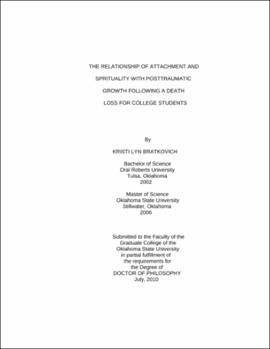| dc.contributor.advisor | Winterowd, Carrie | |
| dc.contributor.author | Bratkovich, Kristi Lyn | |
| dc.date.accessioned | 2013-11-26T08:27:37Z | |
| dc.date.available | 2013-11-26T08:27:37Z | |
| dc.date.issued | 2010-07 | |
| dc.identifier.uri | https://hdl.handle.net/11244/6936 | |
| dc.description.abstract | Scope and Method of Study: The purpose of the present study is to explore the relationship of college students' general spiritual beliefs and practices and the quality and nature of their relationships with others (i.e., general attachment: secure, preoccupied, dismissive, fearful), with their bereavement and posttraumatic growth following the loss of a loved one. The sample consisted of 131 participants who completed an on-line survey including a demographic sheet, the Hogan Grief Reaction Checklist (Hogan, 2001), the Post-Traumatic Growth Inventory (Tedeschi & Calhoun, 1996), the Spirituality Involvement and Beliefs Scale (Hatch, Burg, Naberhaus, & Hellmich; 1999), and the Relationships Questionnaire (Bartholomew and Horowitz, 1991). Analyses utilized in this study were a Pearson correlation and multiple linear regressions. | |
| dc.description.abstract | Findings and Conclusions: Results indicated that spirituality and posttraumatic growth were positively correlated. There was a significant negative correlation between the amount of distress due to grief and level of spirituality. Fearful attachment to others in general was positively correlated with grief distress and was positively correlated with posttraumatic growth. Secure attachment was positively correlated with posttraumatic growth. A multiple regression found that spirituality and general attachment styles accounted for 25.6% of the variance in posttraumatic growth scores. A multiple regression found that spirituality and general attachment styles accounted for 16.8% of the variance in grief distress scores. Future research may be used to determine the influence of other variables in understanding PTG, the importance of studying the attachment styles in clinical samples of college students, including use of clinical interviews and behavioral observations. Implications for practice include helping college students to utilize their spiritual beliefs and interpersonal styles in order to help them cope with grief experiences, as well as, facilitate growth experiences. | |
| dc.format | application/pdf | |
| dc.language | en_US | |
| dc.rights | Copyright is held by the author who has granted the Oklahoma State University Library the non-exclusive right to share this material in its institutional repository. Contact Digital Library Services at lib-dls@okstate.edu or 405-744-9161 for the permission policy on the use, reproduction or distribution of this material. | |
| dc.title | Relationship of attachment and spirituality with posttraumatic growth following a death loss for college students | |
| dc.contributor.committeeMember | Carlozzi, Barbara | |
| dc.contributor.committeeMember | Romans, John | |
| dc.contributor.committeeMember | Shriver, Thomas | |
| osu.filename | Bratkovich_okstate_0664D_11015.pdf | |
| osu.accesstype | Open Access | |
| dc.type.genre | Dissertation | |
| dc.type.material | Text | |
| thesis.degree.discipline | Educational Psychology | |
| thesis.degree.grantor | Oklahoma State University | |
